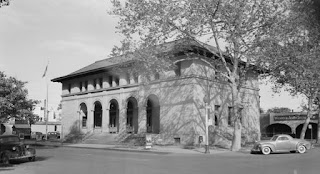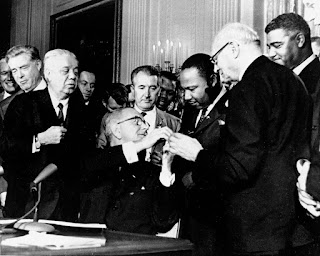… a new “Eden Indeed” recollection …
Jimmy Lee cleaned the old downtown post office in Chico before the new one was built on Vallombrosa Avenue. Dad stayed on to deliver the mail near downtown after the old building was renamed the Mid-Town Station. Jimmy stayed on to clean.
As a nine-year-old, I didn’t know Jimmy very well. I do recall once going over to his tiny house positioned in the middle of a peach orchard near Sandy Gulch; an area that has since been sub-divided. We’d visited because Jimmy wanted to share some of his home made peach brandy with Dad. The formula for the concoction was something he’d picked up from his formerly enslaved grandpa back when Jimmy was a tad in Arkansas. The sip I took tasted sweet and fiery all at the same time. Dad brought some home in Mason jars and stored it in the cellar, but I don’t think he ever drank the stuff.
When I’d visit the Mid-Town to join up with Dad after his routes, the clerk would stamp my hands and arms with those rubber stamps that said things like “First Class” or “Via Air Mail” and send me, tattooed, to the back room where mail was sorted and thrown and where kids weren’t supposed to go. As Dad headed out the back door rubbing my burr-cut noggin, Jimmy pushed and twisted a wide dry mop sweeping cigarette ash, paper scraps and dust from under the sorting stations and across the slick concrete floor.
“Have a good evening, Mistah Delgardo,” Jimmy would holler as we left. “And you,” he said to me, “you bettah wash them ink marks off’n your arm or your Dad might just decide to mail you off somewhere and I’d nevah get to see you agin.”
His words made me glow, but I thought it odd: Nobody ever called Dad “Mister Delgardo.”
One Friday, after a week of wet and cold weather, I was snuck into the back room to discover Jimmy Lee absent.
“Where’s Mr. Lee?” I asked.
Dad explained. The Mid-Town was the place mail was left to be carried on the rural route up the Deer Creek Highway to Forest Ranch and points beyond. Occasionally the mountainous five-mile road to Butte Meadows and Jonesville was closed at Lomo Junction due to snow. The rural route carrier was stuck with mail he couldn’t deliver.
One day Jimmy was talking with the guys about a pair of snow skis he’d fashioned out of some hardwood or other and used ‘em when it snowed in the Ozarks. Overhearing this, the postmaster asked Jimmy if he’d like to try his hand at delivering the mail to Butte Meadows when the road was closed. He jumped at the chance.
Eventually – but only when the weather had turned cold and sloppy and snowy up the hill – the Mid-Town Station would not get swept out, because the “ask” had become an expectation, rather like a demand. This had been one of those weeks.
Dad explained all this adding, “Jimmy Lee knows his place.”
My father was anything but racist. He adored Leontyne Price’s soprano. Dad sympathized with the famed baritone Paul Robeson as he left the country. He knew Satchel Page should have been in the majors and Willie Mays was worth every penny. He applauded as Roger Mudd reported on the Civil Rights Act of 1964 being signed by the President – I remember there being tears in his eyes – and the voting rights act a year later. Dad, without Mom, attended the local Unitarian Church and often hosted that group’s pastor – a black man and his son – at our table for dinner.
Mom was appalled. She more than once voiced, “What will the neighbors think?”
She, a child of deep south Houston Texas in the 20s and 30s saw nothing wrong with referring to little black kids from the poorer side of town as “picaninnies.” She also called the bubbles that float atop a mud puddle “nigger babies.” As a kid growing up in the 60s, I somehow grew past thinking that such terminology okay. Maybe somebody once boxed my ears. At any rate, Mom didn’t know any better and Dad, when it came to maintaining a harmonious relationship on the home front, was wise enough – or timid enough – just to not say anything.
Jimmy Lee was a genuine man. A good man. A friendly and honest man. From my nine-year-old point of view I thought him a man willing to accept any challenge – someone to look up to. The relationships among those at the Mid-Town Station were honed by upbringings from the era when the Civil War was still less than a life-time distant. People’s biases were sadly acceptable. Jimmy operated in that world. So did my father, I guess.
Reflecting many, many times on Dad’s off-handed “Jimmy Lee knows his place” comment, I’d like to think that had Dad grown up in the 60s, he never would have said such a thing as an adult. Dad wasn’t racist. He just didn’t know any better.
And reflecting back on Jimmy Lee, I’ve always sorta wondered if he carried a flask of his peach brandy on those snow-bound delivery trips to Butte Meadows. You know – to keep himself warm.
© 2023
Church of the Open Road Press



